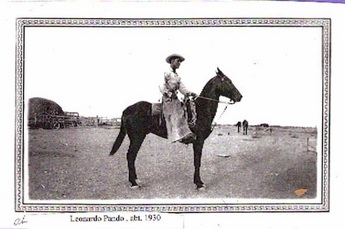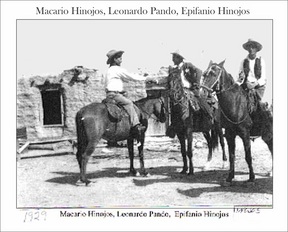Leonardo Pando
|
Lorenza Garza
|
Leonardo Pando married Lorenza Garza
Their child:
1. María Isabel, born November 2, 1944 in Brewster County.
1. María Isabel, born November 2, 1944 in Brewster County.
The Life of Leonardo Pando
By María Isabel Pando
By María Isabel Pando
Leonardo Pando was born in Terlingua in 1910 at the time Pancho Villa started the revolution in Mexico. This influenced their lives; since he often talked about how sometimes the family lived on this side of the Rio Grande, and sometimes they would have to move to Mexico because of the revolution. He never attended school, which is something he regretted. The reason he did not attend school was the lack of money to buy school supplies. Therefore, he always stressed that everyone should be educated. The fact that he did not know how to read or write certainly bothered him. Yet, many people who talked with him could not believe that he never attended school. He discussed issues very intelligently and could talk about a variety of subjects. Yet in spite of this, the one thing he never discussed was his father. All he would say about his father, Atilano, was that he worked in the mines in Terlingua and died when Leonardo was very young. In fact, the only memories I have of him discussing his childhood was about him telling us that he did not always have shoes. He would say that if he did have shoes, he would take them off so he could run faster.
He would talk about how he would bootleg from Mexico. He would travel through the Big Bend country with horses or mules. At this time he was known as "El Chamaco" (the Kid). Leonardo or ‘Nardo, as some of his sisters called him, would say “nothing ever happens to me. I always prayed,” he would say. “One night I went to sleep somewhere out in the mountains and when I woke up the ground was covered with snow. I had been dreaming that I was talking to Mary and Joseph.” That was something that he always stressed, “you need to pray a lot.” As a matter of fact, one way to discipline me was to tell me to kneel before an altar to ask for forgiveness and to pray.
He was a man who had very strong opinions. He was friendly and liked people very much. He said there was a way to talk to every person; he would even model the way one should stand before a person. If it were a child or an adult he would indicate how one should stand. He always stressed that one should always speak properly, he did not like for me to use slang. He had many friends. Both young and old liked him. He welcomed everyone into his home. He loved to drink coffee, so everyone was invited to drink coffee. He liked to get up early in the morning, and it was not unusual for him to get up at 4:00 or 4:30 in the morning. He would drink at least two pots of coffee before going to work. He would always say, “In the morning your mind is fresh. One can think better. The mind has rested all night.”
He loved to whistle and sing songs (corridos). Some of the songs he sang were about the revolution of 1910 and of events that happened. He liked to listen to radio programs, the news and novelas.
He was a very hard-working man. Most of his life he worked on ranches. He would milk cows, brand cattle, ride horses, tame horses, and rope both for work and at rodeos. He was short, about 5’ 4” and was often called Chapo by his bosses. Other people simply called him Pando. He enjoyed competing in rodeos around the area. At that time many of his friends were people who enjoyed rodeos. People like Salomon Ramos, his compadre and town barber, Benito García, from Marathon, Nito Martínez from Fort Davis, Lucas Aguirre from Marfa, these were some of his rodeo buddies. Leonardo had a horse named Happy that he used in rodeos; he had him for a long time.
He had dark curly hair, and eyes that gleamed with curiosity. He was a very proud man. As he got older he would dye his hair black. He always wore western shirts, Levi pants and cowboy boots.
He always went to Mexico to visit his relatives. His mother, Marcelina, lived in La Hacienda de Orientales. He would go visit her two or three times a year. He would take her food and money. When his mother moved to Ojinaga, he would go more often to see her. He always stayed in touch with all his family. To many of his nephews and nieces he was their favorite uncle.
Leonardo died of cancer in Alpine, Texas on December 22, 1978.
He would talk about how he would bootleg from Mexico. He would travel through the Big Bend country with horses or mules. At this time he was known as "El Chamaco" (the Kid). Leonardo or ‘Nardo, as some of his sisters called him, would say “nothing ever happens to me. I always prayed,” he would say. “One night I went to sleep somewhere out in the mountains and when I woke up the ground was covered with snow. I had been dreaming that I was talking to Mary and Joseph.” That was something that he always stressed, “you need to pray a lot.” As a matter of fact, one way to discipline me was to tell me to kneel before an altar to ask for forgiveness and to pray.
He was a man who had very strong opinions. He was friendly and liked people very much. He said there was a way to talk to every person; he would even model the way one should stand before a person. If it were a child or an adult he would indicate how one should stand. He always stressed that one should always speak properly, he did not like for me to use slang. He had many friends. Both young and old liked him. He welcomed everyone into his home. He loved to drink coffee, so everyone was invited to drink coffee. He liked to get up early in the morning, and it was not unusual for him to get up at 4:00 or 4:30 in the morning. He would drink at least two pots of coffee before going to work. He would always say, “In the morning your mind is fresh. One can think better. The mind has rested all night.”
He loved to whistle and sing songs (corridos). Some of the songs he sang were about the revolution of 1910 and of events that happened. He liked to listen to radio programs, the news and novelas.
He was a very hard-working man. Most of his life he worked on ranches. He would milk cows, brand cattle, ride horses, tame horses, and rope both for work and at rodeos. He was short, about 5’ 4” and was often called Chapo by his bosses. Other people simply called him Pando. He enjoyed competing in rodeos around the area. At that time many of his friends were people who enjoyed rodeos. People like Salomon Ramos, his compadre and town barber, Benito García, from Marathon, Nito Martínez from Fort Davis, Lucas Aguirre from Marfa, these were some of his rodeo buddies. Leonardo had a horse named Happy that he used in rodeos; he had him for a long time.
He had dark curly hair, and eyes that gleamed with curiosity. He was a very proud man. As he got older he would dye his hair black. He always wore western shirts, Levi pants and cowboy boots.
He always went to Mexico to visit his relatives. His mother, Marcelina, lived in La Hacienda de Orientales. He would go visit her two or three times a year. He would take her food and money. When his mother moved to Ojinaga, he would go more often to see her. He always stayed in touch with all his family. To many of his nephews and nieces he was their favorite uncle.
Leonardo died of cancer in Alpine, Texas on December 22, 1978.
This article written by his daughter, María Isabel.
Copyright © 2011Maria Isabel Pando all rights reserved
Copyright © 2011Maria Isabel Pando all rights reserved
Leonardo Pando Family Album
click on photos to enlarge them
click on photos to enlarge them
link to the Macario Hinojos Family Page
The information on this page is from Bob Wirt and Louisa Madrid's report The Marcos Ramirez Family Documented Research Report in Life Before the Ruins. The photographs were provided by María Isabel G. Pando, daughter of Leonardo.



